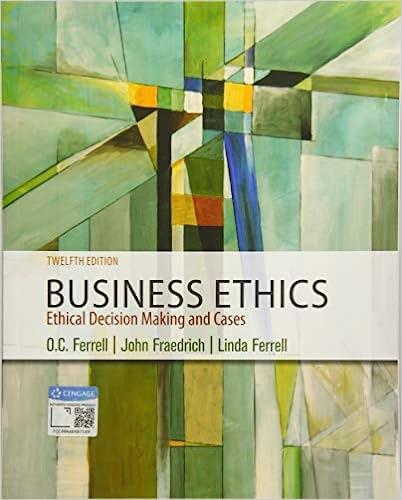Steven, a junior at Northeast State, just started working part-time at a local fast food restaurant chain.
Question:
Steven, a junior at Northeast State, just started working part-time at a local fast food restaurant chain. Although not his dream job, it paid for tuition and books, and the restaurant gave him the flexible schedule he needed for school. After a few months, Steven found he got along well with all of his coworkers, but it was apparent they did not respect the company or the management. The employees made fun of their bosses and treated the work area like a playground. In some respects, Steven thought it was a fun environment to work in, especially after hours when management was gone for the day. They played their music loudly, laughed, and talked with one another during the down times instead of cleaning up their work areas like they were supposed to. Despite the fact there were ethical policies telling employees how they were expected to act in the workplace, these policies never seemed to be enforced.
One day, while working with his coworker Julie on the food assembly table, Steven saw Julie accidentally drop a meat patty on the floor. Without so much as a flinch, she bent down, picked up the patty, stuck it back on the bun, and wrapped it up. It happened so fast that Steven wasn’t even sure he had seen right—especially since Julie had done it so casually. Steven watched in dismay as another worker took the hamburger out to the customer.
Over the next few weeks, Steven saw others, including the shift supervisor, do the same thing with burgers and other products. Once, an entire cheeseburger hit the greasy floor, was picked up, and was taken to the customer. This time the customer complained the burger tasted funny and sent it back. Steven noticed other unsanitary practices such as employees not washing their hands between handling meat and vegetables and not washing utensils between uses. Obviously, such practices were against company policies and, if reported, the supervisors in charge could get in trouble and the restaurant would face investigations from the health department. However, there was ample opportunity for things like this to occur. There was no one watching them, and the shift supervisor also engaged in these activities. Steven felt it was the company’s responsibility to hire good people, so they were to blame if these things happened.
One day, Steven approached Julie and asked, “Why do so many people here serve food that has fallen on the floor to customers?”
Julie thought about it briefly as though she had never considered it before and replied, “I guess it’s because it would take too much time to get another beef patty out of the freezer, cook it, and serve it to the customer. This is a fast food restaurant, after all, and I’m not interested in hearing customers complain about the time it takes for them to get their food. Besides, the restaurants with the fastest service get a bonus from corporate headquarters.
Last year the supervisors rewarded us with some extra money for doing our jobs so quickly.”
Steven was somewhat taken aback by the honest reply and asked, “Wouldn’t you be disgusted if you were served dirty food at a restaurant?”
This time Julie’s response was quick. She said, “What I don’t know won’t hurt me.” She walked off.
Several weeks went by and the same practices continued. Steven became more and more concerned about the consequences that could happen in an environment so laid back and unconcerned about safety and health. It seemed like the more time that passed, the worse everyone’s attitude became.
One day, at the beginning of his shift, Steven noticed the walk-in freezer had been left open. As he went to shut the door, he discovered a smell of rotten meat. It almost made him vomit. “How could this happen?” he wondered.
He threw away the rotten meat without asking anyone because he was afraid of what the answer might be.
After Steven threw out the spoiled meat, he began to wonder how the culture of the restaurant got to the point of supporting such practices. He realized the seemingly minor unsanitary practices allowed major issues to arise that could possibly hurt someone. Steven felt he should say or do something but to whom? He sat down and pondered what he should do.
Questions:-
1. Describe the nature of the organizational culture in the restaurant. What kind of opportunities are there for unethical behavior to occur? Are there any opportunities for ethical behavior?
2. What are some of the incentives employees might have to engage in this type of behavior?
3. If the organizational culture of the restaurant does not change, what are some likely outcomes and consequences?
Step by Step Answer:

Business Ethics Ethical Decision Making And Cases
ISBN: 9781337614436
12th Edition
Authors: O. C. Ferrell, John Fraedrich, Linda Ferrell





